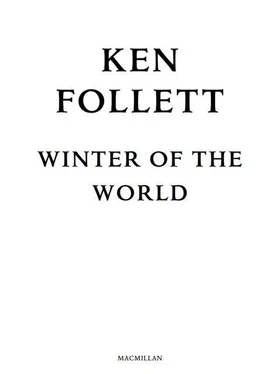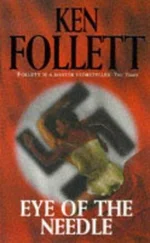Ken Follett - Winter of the World (Century Trilogy 2)
Здесь есть возможность читать онлайн «Ken Follett - Winter of the World (Century Trilogy 2)» весь текст электронной книги совершенно бесплатно (целиком полную версию без сокращений). В некоторых случаях можно слушать аудио, скачать через торрент в формате fb2 и присутствует краткое содержание. Жанр: Старинная литература, на английском языке. Описание произведения, (предисловие) а так же отзывы посетителей доступны на портале библиотеки ЛибКат.
- Название:Winter of the World (Century Trilogy 2)
- Автор:
- Жанр:
- Год:неизвестен
- ISBN:нет данных
- Рейтинг книги:5 / 5. Голосов: 2
-
Избранное:Добавить в избранное
- Отзывы:
-
Ваша оценка:
- 100
- 1
- 2
- 3
- 4
- 5
Winter of the World (Century Trilogy 2): краткое содержание, описание и аннотация
Предлагаем к чтению аннотацию, описание, краткое содержание или предисловие (зависит от того, что написал сам автор книги «Winter of the World (Century Trilogy 2)»). Если вы не нашли необходимую информацию о книге — напишите в комментариях, мы постараемся отыскать её.
Winter of the World (Century Trilogy 2) — читать онлайн бесплатно полную книгу (весь текст) целиком
Ниже представлен текст книги, разбитый по страницам. Система сохранения места последней прочитанной страницы, позволяет с удобством читать онлайн бесплатно книгу «Winter of the World (Century Trilogy 2)», без необходимости каждый раз заново искать на чём Вы остановились. Поставьте закладку, и сможете в любой момент перейти на страницу, на которой закончили чтение.
Интервал:
Закладка:
Volodya’s boss, General Lemitov, saw the coup as a public relations catastrophe for the USSR. Masaryk had constituted proof, to the world, that East European countries could be free and independent in the shadow of the USSR. He had enabled Czechoslovakia to have a Communist government friendly to the Soviet Union and at the same time wear the costume of bourgeois democracy. This had been the perfect arrangement, for it gave the USSR everything it wanted while reassuring the Americans. But that equilibrium had been upset.
However, Ilya was crowing. ‘The bourgeois parties have been smashed!’ he said to Volodya in the hotel bar one night.
‘Did you see what happened in the American Senate?’ Volodya said mildly. ‘Vandenberg, the old isolationist, made an eighty-minute speech in favour of the Marshall Plan, and he was cheered to the rafters.’
George Marshall’s vague ideas had become a plan. This was mainly thanks to the rat-like cunning of British Foreign Secretary Ernie Bevin. In Volodya’s opinion, Bevin was the most dangerous kind of anti-Communist: a working-class social democrat. Despite his bulk he moved fast. With lightning speed he had organized a conference in Paris that had given a resounding collective European welcome to George Marshall’s Harvard speech.
Volodya knew, from spies in the British Foreign Office, that Bevin was determined to bring Germany into the Marshall Plan and keep the USSR out. And Stalin had fallen straight into Bevin’s trap, by commanding the East European countries to repudiate Marshall Aid.
Now the Soviet secret police seemed to be doing all they could to assist the passage of the bill through Congress. ‘The Senate was all set to reject Marshall,’ Volodya said to Ilya. ‘American taxpayers don’t want to foot the bill. But the coup here in Prague has persuaded them that they have to, because European capitalism is in danger of collapse.’
Ilya said indignantly: ‘The bourgeois Czech parties wanted to take the American bribe.’
‘We should have let them,’ said Volodya. ‘It might have been the quickest way to sabotage the whole scheme. Congress would then have rejected the Marshall Plan – they don’t want to give money to Communists.’
‘The Marshall Plan is an imperialist trick!’
‘Yes, it is,’ said Volodya. ‘And I’m afraid it’s working. Our wartime allies are forming an anti-Soviet bloc.’
‘People who obstruct the forward march of Communism must be dealt with appropriately.’
‘Indeed they must.’ It was amazing how consistently people such as Ilya made the wrong political judgements.
‘And I must go to bed.’
It was only ten, but Volodya went too. He lay awake thinking about Zoya and Kotya and wishing he could kiss them both goodnight.
His thoughts drifted to his mission. He had met Jan Masaryk, the symbol of Czech independence, two days earlier, at a ceremony at the grave of his father, Thomas Masaryk, the founder and first President of Czechoslovakia. Dressed in a coat with a fur collar, head bared to the falling snow, the second Masaryk had seemed beaten and depressed.
If he could be persuaded to stay on as Foreign Minister, some compromise might be possible, Volodya mused. Czechoslovakia could have a thoroughly Communist domestic government, but in its international relations it might be neutral, or at least minimally anti-American. Masaryk had both the diplomatic skills and the international credibility to walk that tightrope.
Volodya decided he would suggest it to Lemitov tomorrow.
He slept fitfully and woke before six o’clock with a mental alarm ringing in his imagination. It was something about last night’s conversation with Ilya. Volodya ran over it again in his mind. When Ilya had said People who obstruct the forward march of Communism he had been talking about Masaryk; and when a secret policeman said someone had to be dealt with appropriately he always meant killed.
Then Ilya had gone to bed early, which suggested an early start this morning.
I’m a fool, Volodya thought. The signs were there and it took me all night to read them.
He leaped out of bed. Perhaps he was not too late.
He dressed quickly and put on a heavy overcoat, scarf and hat. There were no taxis outside the hotel – it was too early. He could have called a Red Army car, but by the time a driver was awakened and the car brought it would take the best part of an hour.
He set out to walk. The Czernin Palace was only a mile or two away. He headed west out of Prague’s gracious city centre, crossed the St Charles Bridge, and hurried uphill towards the castle.
Masaryk was not expecting him, nor was the Foreign Minister obliged to give audience to a Red Army colonel. But Volodya felt sure Masaryk would be curious enough to see him.
He walked fast through the snow and reached the Czernin Palace at six-forty-five. It was a huge baroque building with a grandiose row of Corinthian half-columns on the three upper storeys. The place was lightly guarded, he found to his surprise. A sentry pointed to the front door. Volodya walked unchallenged through an ornate hall.
He had expected to find the usual secret police moron behind a reception desk, but there was no one. This was a bad sign, and he was filled with foreboding.
The hall led to an inner courtyard. Glancing through a window, he saw what looked like a man sleeping in the snow. Perhaps he had fallen there drunk: if so, he was in danger of freezing to death.
Volodya tried the door and found it open.
He ran across the quadrangle. A man in blue silk pyjamas lay face down on the ground. There was no snow covering him, so he could not have been there many minutes. Volodya knelt beside him. The man was quite still and did not appear to be breathing.
Volodya looked up. Rows of identical windows like soldiers on parade looked into this courtyard. All were closed tightly against the freezing weather – except one, high above the man in pyjamas, that stood wide open.
As if someone had been thrown out of it.
Volodya turned the lifeless head and looked at the man’s face.
It was Jan Masaryk.
(ii)
Three days later in Washington, the Joint Chiefs of Staff presented to President Truman an emergency war plan to meet a Soviet invasion of Western Europe.
The danger of a third world war was a hot topic in the press. ‘We just won the war,’ Jacky Jakes said to Greg Peshkov. ‘How come we’re about to have another?’
‘That’s what I keep asking myself,’ said Greg.
They were sitting on a park bench while Greg took a breather from throwing a football with Georgy.
‘I’m glad he’s too young to fight,’ Jacky said.
‘Me, too.’
They both looked at their son, standing talking to a blonde girl about his age. The laces of his Keds were undone and his shirt was untucked. He was twelve years old and growing up. He had a few soft black hairs on his upper lip, and he seemed three inches taller than last week.
‘We’ve been bringing our troops home as fast as we can,’ Greg said. ‘So have the British and the French. But the Red Army stayed put. Result: they now have three times as many soldiers in Germany as we do.’
‘Americans don’t want another war.’
‘You can say that again. And Truman hopes to win the Presidential election in November, so he’s going to do everything he can to avoid war. But it may happen anyway.’
‘You’re getting out of the army soon. What are you going to do?’
There was a quaver in her voice that made him suspect the question was not as casual as she pretended. He looked at her face, but her expression was unreadable. He answered: ‘Assuming America is not at war, I’m going to run for Congress in 1950. My father has agreed to finance my campaign. I’ll start as soon as the Presidential election is over.’
Читать дальшеИнтервал:
Закладка:
Похожие книги на «Winter of the World (Century Trilogy 2)»
Представляем Вашему вниманию похожие книги на «Winter of the World (Century Trilogy 2)» списком для выбора. Мы отобрали схожую по названию и смыслу литературу в надежде предоставить читателям больше вариантов отыскать новые, интересные, ещё непрочитанные произведения.
Обсуждение, отзывы о книге «Winter of the World (Century Trilogy 2)» и просто собственные мнения читателей. Оставьте ваши комментарии, напишите, что Вы думаете о произведении, его смысле или главных героях. Укажите что конкретно понравилось, а что нет, и почему Вы так считаете.












